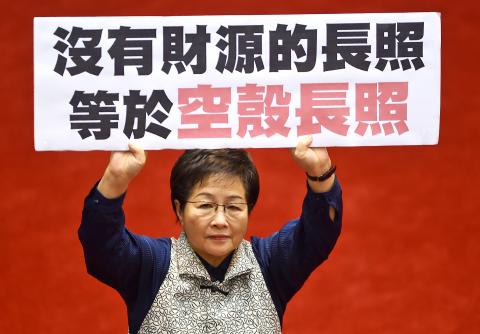The legislature yesterday passed a draft bill on long-term care services, clearing the way for the Chinese Nationalist Party’s (KMT) proposals over the funding of long-term care to be written into law.
After eight cross-caucus negotiation sessions and a multitude of debates involving the KMT, the Democratic Progressive Party (DPP) and civic groups, the bill finally passed after a controversial clause on the source of funding for the care services was put to a floor vote — considered a last resort for the passage of a bill.
The KMT-authored bill stipulates that funding should come from public coffers, health surcharges on tobacco, donations, interest from the fund and other sources, while the DPP called for an increase of inheritance and gift taxes.

Photo: Liu Hsin-de, Taipei Times
“The legislation is progressive as it guarantees universal, plural and affordable services and the dignity and rights of both care-receivers and caregivers. Discrimination, whether it is based on gender, sexual orientation, class, race or religion, has also been clearly prohibited,” Democratic Progressive Party (DPP) Legislator Yu Mei-nu (尤美女) said. “However, it is regrettable that this progressive act lacks the funding to be extensively and substantively enforced. The clause on funding voted for by the KMT caucus allows for NT$12 billion (US$392 million) in government funding over five years, which is only NT$2.4 billion per year. How plural, universal and affordable could these services be?”
DPP Legislator Lin Shu-fen (林淑芬) criticized the passage of the bill, saying that without proper funding the legislation would be “a continuation of what used to be called the ‘residual welfare model.’”
“It shows that the government does not want to establish a public and universal system of care services, but instead, with the long-term care service insurance act soon to be passed, give out financial subsidies to those needing services, which would surely commercialize and stratify the system, with most people denied high-quality and affordable services,” Lin said.
The KMT viewed the passage more positively.
“There are close to about 800,000 disabled people [who need these services] in the nation, which means that the passage would benefit more than 2 million people, [including those who need the services and their families],” Minister of Health and Welfare Chiang Been-huang (蔣丙煌) said.
The legislation provides a legal framework for the integration of various types of long-term care services.
Personnel management and training; management of institutions; protection of the rights of the care-receivers and encouraging and rewarding measures for the development of services, are the four major pillars of the act and will enhance the quality of the nations long-term care services, Chinese Nationalist Party (KMT) Legislator Alicia Wang (王育敏) said.
The act also allows for employed, personal and family caregivers to be systematically incorporated into the long-term care systen framework, with the former group, including migrant caregivers, provided with training and the latter with respite care services, she said.

Taiwanese were praised for their composure after a video filmed by Taiwanese tourists capturing the moment a magnitude 7.5 earthquake struck Japan’s Aomori Prefecture went viral on social media. The video shows a hotel room shaking violently amid Monday’s quake, with objects falling to the ground. Two Taiwanese began filming with their mobile phones, while two others held the sides of a TV to prevent it from falling. When the shaking stopped, the pair calmly took down the TV and laid it flat on a tatami mat, the video shows. The video also captured the group talking about the safety of their companions bathing

US climber Alex Honnold is to attempt to scale Taipei 101 without a rope and harness in a live Netflix special on Jan. 24, the streaming platform announced on Wednesday. Accounting for the time difference, the two-hour broadcast of Honnold’s climb, called Skyscraper Live, is to air on Jan. 23 in the US, Netflix said in a statement. Honnold, 40, was the first person ever to free solo climb the 900m El Capitan rock formation in Yosemite National Park — a feat that was recorded and later made into the 2018 documentary film Free Solo. Netflix previewed Skyscraper Live in October, after videos

Starting on Jan. 1, YouBike riders must have insurance to use the service, and a six-month trial of NT$5 coupons under certain conditions would be implemented to balance bike shortages, a joint statement from transportation departments across Taipei, New Taipei City and Taoyuan announced yesterday. The rental bike system operator said that coupons would be offered to riders to rent bikes from full stations, for riders who take out an electric-assisted bike from a full station, and for riders who return a bike to an empty station. All riders with YouBike accounts are automatically eligible for the program, and each membership account

A classified Pentagon-produced, multiyear assessment — the Overmatch brief — highlighted unreported Chinese capabilities to destroy US military assets and identified US supply chain choke points, painting a disturbing picture of waning US military might, a New York Times editorial published on Monday said. US Secretary of Defense Pete Hegseth’s comments in November last year that “we lose every time” in Pentagon-conducted war games pitting the US against China further highlighted the uncertainty about the US’ capability to intervene in the event of a Chinese invasion of Taiwan. “It shows the Pentagon’s overreliance on expensive, vulnerable weapons as adversaries field cheap, technologically